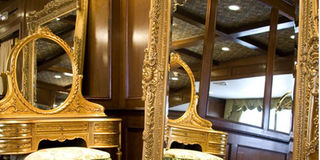Don't shoot messenger, says documentary photographer

A picture of an expensive antique mirror and dresser. In his pictures, sagging flesh is mercilessly exposed, food shovelled into mouths, luxury flaunted, often with unflattering results that serve as a critique of modern consumer culture. Photo/FILE
What you need to know:
- In his pictures, sagging flesh is mercilessly exposed, food shovelled into mouths, luxury flaunted, often with unflattering results that serve as a critique of modern consumer culture.
- The late French photographer Henri Cartier-Bresson said he appeared to come "from a totally different planet", in a comment not intended as a compliment.
British documentary photographer Martin Parr doesn't see it as his job to collude with other people's view of themselves.
It's a stance that has left him open to charges of cruelty toward his subjects.
Whether it be the rich at play or the poor in humdrum scenes of everyday life, Parr's unvarnished, warts-and-all version of reality divides the photographic world.
In his pictures, sagging flesh is mercilessly exposed, food shovelled into mouths, luxury flaunted, often with unflattering results that serve as a critique of modern consumer culture.
If people don't like it, Parr has said, it is often because they have not come to terms with the way they look or the underlying issues raised by the images.
British photo editor and writer Colin Jacobson once debated in print whether Parr should be hailed for his innovation or condemned as a "gratuitously cruel social critic who has made large amounts of money by sneering at the foibles and pretensions of other people".
The late French photographer Henri Cartier-Bresson said he appeared to come "from a totally different planet", in a comment not intended as a compliment.
Parr responded: "I always cherish this remark, and wrote back, 'I know what you mean, but why shoot the messenger?'".
The 61-year-old, who declined to be photographed for this interview citing time pressure, defends himself by saying he welcomes all criticism and that the cornerstone of everything he does is "integrity".
Instead, he prefers to see his pictures not as cruel or satirical, but as "British irony" or containing a "sense of mischief".
He attributes much of the controversy surrounding his images to them not being what he calls "propaganda".
"That (propaganda) is the role of most photography we see in the world," he told AFP in an interview in Paris.
'PEOPLE QUESTION IT'
"That's why if you do something different like what I'm trying to do, people question it, it's other things we should be questioning.
"I'm not saying I'm telling the truth (in my pictures), obviously it's very subjective, at least it's my own little version (of the truth)."
Modern-day photographic propaganda noted by Parr includes most people's family photograph albums and Facebook pages.
"People have this fictional idea about what a perfect family should be like, most family albums and Facebook pages pursue that policy," he said.
Parr's latest book -- he has published over 70 -- is a return to one of his first major photographic projects.
"The Non-conformists" documents communities in and around the northern British town of Hebden Bridge in the late 1970s.
Brought up in the suburban town of Epsom, not far from London, Parr said he was intrigued by the contrast with the more traditional north.
The black and white images show a world where life appears to have changed little over the preceding decades.
A landowner shoots grouse on the moor, miners work down the pit, elderly worshippers attend services at a Methodist chapel.
In other images, there are street parties to mark Queen Elizabeth's silver jubilee, old ladies in hats take afternoon tea, while postmen relax over steaming bowls of porridge after an early-morning shift.
Published in book form now for the first time simply, he says, because the opportunity arose, he added that the area had "changed quite dramatically" in the intervening years.
"It's become a lot more touristy. Many of the chapels have closed. Some places are touristy anyway, this is one of the places that invented itself and became a tourist location," he said.
Probably more "respectful" of his subjects than his subsequent work, Parr says he understands people's desire not to be cast in an unflattering light -- indeed he has his own website which describes his work in positive terms.
But Parr, a member of the Magnum photo agency since 1994, says the approval of his subjects is irrelevant to him.
"I don't go around gauging what people think of my work, it's not my job to do that, ever," he said.
Asked if his own work is guilty of stereotyping people, he laughs.
"I welcome all criticism... being controversial is never something I particularly started out to do but it has been part of my career so the more I get of it the happier I am," he said.





